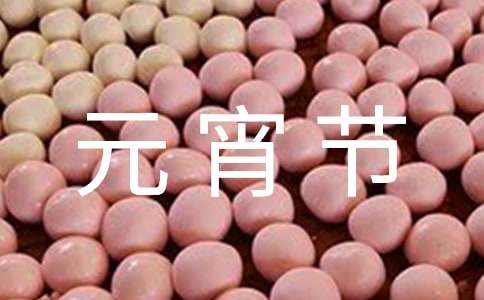- 相关推荐
元宵节的由来英语简介
在人们越来越注重自身素养的今天,元宵节的由来的适用范围越来越广泛,元宵节的由来具有成文事后性的特点。我敢肯定,大部分人都对写元宵节的由来很是头疼的,以下是小编整理的元宵节的由来英语简介,欢迎阅读,希望大家能够喜欢。

Origin
There are many different beliefs about the origin of the Lantern Festival. But one thing for sure is that it had something to do with religious worship.
One legend tells us that it was a time to worship Taiyi, the God of Heaven in ancient times. The belief was that the God of Heaven controlled the destiny of the human world. He had sixteen dragons at his beck and call and he decided when to inflict drought, storms, famine or pestilence(瘟疫)upon human beings. Beginning with Qinshihuang, the first emperor to unite the country, all subsequent emperors ordered splendid ceremonies each year. The emperor would ask Taiyi to bring favorable weather and good health to him and his people. Emperor Wudi of the Han Dynasty directed special attention to this event. In 104 BC, he proclaimed it one of the most important celebrations and the ceremony would last throughout the night.
Another legend associates the Lantern Festival with Taoism. Tianguan is the Taoist god responsible for good fortune. His birthday falls on the 15th day of the first lunar month. It is said that Tianguan likes all types of entertainment. So followers prepare various kinds of activities during which they pray for good fortune.
The third story about the origin of the festival is like this. Buddhism first entered China during the reign of Emperor Mingdi of the Eastern Han Dynasty. That was in the first century. However, it did not exert any great influence among the Chinese people. one day, Emperor Mingdi had a dream about a gold man in his palace. At the very moment when he was about to ask the mysterious figure who he was, the gold man suddenly rose to the sky and disappeared in the west. The next day, Emperor Mingdi sent a scholar to India on a pilgrimage(朝圣)to locate Buddhist scriptures. After journeying thousands of miles, the scholar finally returned with the scriptures. Emperor Mingdi ordered that a temple be built to house a statue of Buddha and serve as a repository for the scriptures. Followers believe that the power of Buddha can dispel darkness. So Emperor Mingdi ordered his subjects to display lighted lanterns during what was to become the Lantern Festival.
译文:
起源
元宵节的起源有很多不同的信仰。但有一点可以肯定的是,这与宗教崇拜有关。
有一个传说告诉我们,这是崇拜古代太监天帝的时候。信仰是天神控制着人类世界的命运。他有十六个龙在打电话,他决定什么时候对人类施加干旱,风暴,饥荒或瘟疫(瘟疫)。从第一个统一国家的皇帝秦始皇开始,所有后来的皇帝每年都要下大功臣。皇帝会请太乙为他和他的人民带来有利的天气和健康。汉代无棣特别关注此事。公元前104年,他宣布这是最重要的庆祝活动之一,仪式将持续整个晚上。
另一个传说将元宵节与道教联系起来。天冠是天命的好运。他的生日是农历正月初十五。据说天冠喜欢各种娱乐。所以追随者们准备好各种各样的祈福活动。
关于节日的起源的第三个故事是这样的。佛教在东汉明帝年间首次进入中国。那是在一世纪。但是在中国人身上没有什么大的影响。有一天,明帝皇帝在他的宫殿里梦见了一个金人。当他正想问他那个神秘人物的时候,那个金子突然升起,在西方消失了。第二天,明帝皇帝派一位学者前往印度朝圣(朝圣)定位佛经。经过千里之外,学者终于用经文回来了。明帝皇帝命令建一座寺庙来安置佛像,并作为经文的储存库。追随者相信佛陀的力量可以驱散黑暗。因此,明帝皇帝命令臣民在元宵节期间展示灯笼。
关于元宵节的来历,还有有趣的传说:
灯的传说
传说在很久以前,凶禽猛兽很多,四处伤害人和牲畜,人们就组织起来去打它们,有一只神鸟困为迷路而降落人间,却意外的被不知情的猎人给射死了。天帝知道后十分震怒,立即传旨,下令让天兵于正月十五日到人间放火,把人间的人畜财产通通烧死。天帝的女儿心地善良,不忍心看百姓无辜受难,就冒着生命的危险,偷偷驾着祥云来到人间,把这个消息告诉了人们。众人听说了这个消息,有如头上响了一个焦雷。吓得不知如何是好,过了好久,才有个老人家想出个法子,他说:“在正月十四、十五、十六日这三天,每户人家都在家里张灯结彩、点响爆竹、燃放烟火。这样一来,天帝就会以为人们都被烧死了”。
大家听了都点头称是,便分头准备去了。到了正月十五这天晚上,天帝往下一看,发觉人间一片红光,响声震天,连续三个夜晚都是如此,以为是大火燃烧的火焰,以中大快。人们就这样保住了自己的生命及财产。为了纪念这次成功,从此每到正月十五,家家户户都悬挂灯笼,放烟火来纪念这个日子。
Yuanxiao
Besides entertainment and beautiful lanterns, another important part of the Lantern Festival,or Yuanxiao Festival is eating small dumpling balls made of glutinous rice flour. We call these balls Yuanxiao or Tangyuan. Obviously, they get the name from the festival itself. It is said that the custom of eating Yuanxiao originated during the Eastern Jin Dynasty in the fourth centuty, then became popular during the Tang and Song periods.
The fillings inside the dumplings or Yuansiao are either sweet or salty. Sweet fillings are made of sugar, Walnuts(胡桃), sesame, osmanthus flowers(桂花), rose petals, sweetened tangerine peel, bean paste, or jujube paste(枣泥). A single ingredient or any combination can be used as the filling . The salty variety is filled with minced meat, vegetables or a mixture.
The way to make Yuanxiao also varies between northern and southern China. The usual method followed in southern provinces is to shape the dough of rice flour into balls, make a hole, the filling, then close the hole and smooth out the dumpling by rolling it between your hands. In North China, sweet or nonmeat stuffing is the usual ingredient. The fillings are pressed into hardened cores, dipped lightly in water and rolled in a flat basket containing dry glutinous rice flour. A layer of the flour sticks to the filling, which is then again dipped in water and rolled a second time in the rice flour. And so it goes, like rolling a snowball, until the dumpling is the desired size.
The custom of eating Yuanxiao dumplings remains. This tradition encourages both old and new stores to promote their Yuanxiao products. They all try their best to improve the taste and quality of the dumplings to attract more customers.
译文:
元宵
除了娱乐和美丽的灯笼,元宵节还有元宵节的另一个重要部分是吃糯米粉制成的小饺子球。我们称这些球为元宵或汤圆。显然,他们从节日本身获得了名字。据说元宵饮食习俗起源于东晋时期的第四位,后来在唐宋时期流行起来。
粽子里面的馅料或者是甜的或者咸的。甜馅包括糖,胡桃,芝麻,桂花,玫瑰花瓣,甜瓜皮,豆瓣酱或枣泥。可以使用单一成分或任何组合作为填充物。咸的品种充满碎肉,蔬菜或混合物。
中国北方和中国南方的元宵之路也各有不同。南方省份常用的方法是将米粉面团整理成球,做成一个洞,插入馅料,然后关闭洞,把饺子滚在你的手中。在华北地区,甜或无脂馅是常用的成分。将馅料压入硬化的核心中,轻轻浸入水中,并滚入含有糯米粉的扁平篮子中。一层面粉粘在馅料上,然后再蘸上水,再次在米粉中滚动。就像滚动一个雪球一样,直到饺子是所需的大小。
吃元宵饺子的习俗依然存在。这个传统鼓励新老店铺推广他们的元宵产品。他们尽全力提高饺子的口感和质量,吸引更多的顾客。
Lantern Festival 元宵节的由来英文介绍
Lantern Festival The 15th day of the 1st lunar month
The 15th day of the 1st lunar month is the Chinese Lantern Festival because the first lunar month is called yuan-month and in the ancient times people called night Xiao. The 15th day is the first night to see a full moon. So the day is also called Yuan Xiao Festival in China.
According to the Chinese tradition, at the very beginning of a new year, when there is a bright full moon hanging in the sky, there should be thousands of colorful lanterns hung out for people to appreciate. At this time, people will try to solve the puzzles on the
lanterns and eat yuanxiao (glutinous rice ball) and get all their families united in the joyful atmosphere.






